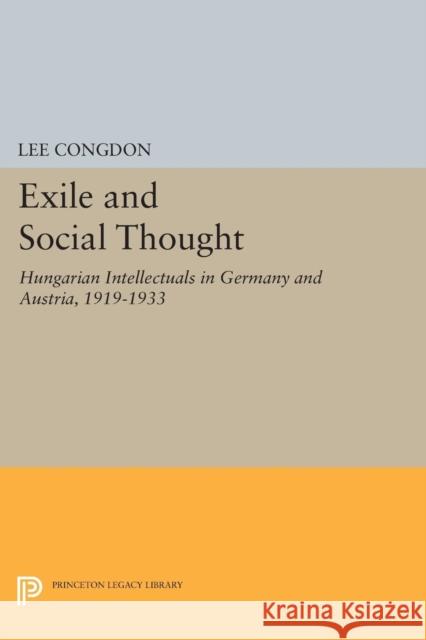Exile and Social Thought: Hungarian Intellectuals in Germany and Austria, 1919-1933 » książka
Exile and Social Thought: Hungarian Intellectuals in Germany and Austria, 1919-1933
ISBN-13: 9780691608396 / Angielski / Miękka / 2014 / 394 str.
Exile and Social Thought: Hungarian Intellectuals in Germany and Austria, 1919-1933
ISBN-13: 9780691608396 / Angielski / Miękka / 2014 / 394 str.
(netto: 268,34 VAT: 5%)
Najniższa cena z 30 dni: 280,01
ok. 30 dni roboczych
Dostawa w 2026 r.
Darmowa dostawa!
Embroiled in the political events surrounding World War I and the failed Hungarian revolutions of 1918-19, a number of intellectuals fled Hungary for Germany and Austria, where they essentially created Weimar culture. Among them were Georg Lukacs, whose History and Class Consciousness recast Marxism and challenged even those who repudiated its politics; Bela Balazs, who pioneered film theory and collaborated with film-makers G. W. Pabst, Leni Riefenstahl, and Alexander Korda; Laszlo Moholy-Nagy, who codirected the Bauhaus during its heyday in the mid-1920s; and Karl Mannheim, whose Ideology and Utopia was the most widely discussed work of noncommunist social theory during the Weimar years. In this collective portrait combining intellectual history with biographical detail, Lee Congdon describes how Hungarian thinkers, each in a different way, passionately advocated the need for community in a Europe torn by war and revolution. Whether communist, avant-gardist, or Catholic convert, each thinker is examined within the vast tapestry of his works, his cultural and intellectual milieu, and his experience as an exile. Despite the ideological differences of these men, Congdon reveals how their personal destinies and social goals often merged. Since many were assimilated Jews, he argues that their thinking on society was inextricably intertwined with their youthful sensitivity to anti-Semitism in Hungary and with the isolating limitations of their lives in Germany and Austria.Originally published in 1991.The Princeton Legacy Library uses the latest print-on-demand technology to again make available previously out-of-print books from the distinguished backlist of Princeton University Press. These editions preserve the original texts of these important books while presenting them in durable paperback and hardcover editions. The goal of the Princeton Legacy Library is to vastly increase access to the rich scholarly heritage found in the thousands of books published by Princeton University Press since its founding in 1905.











